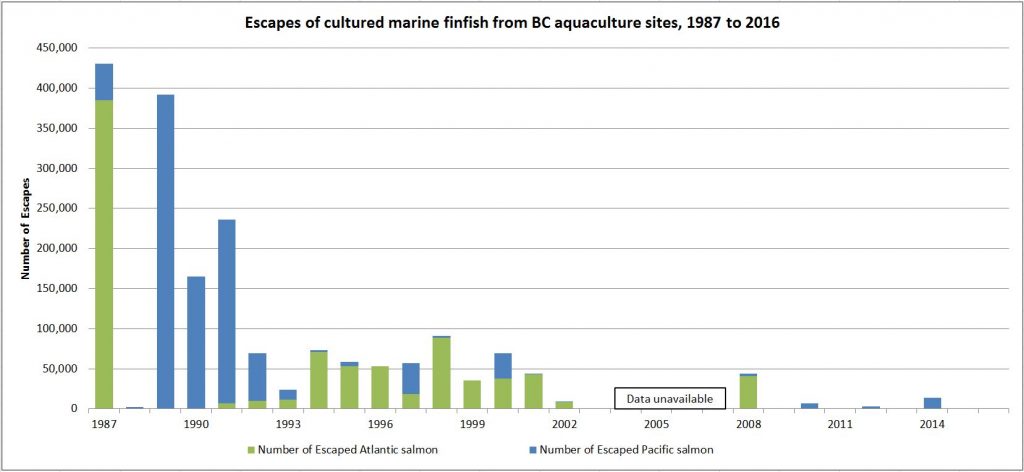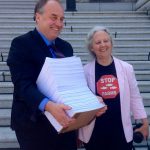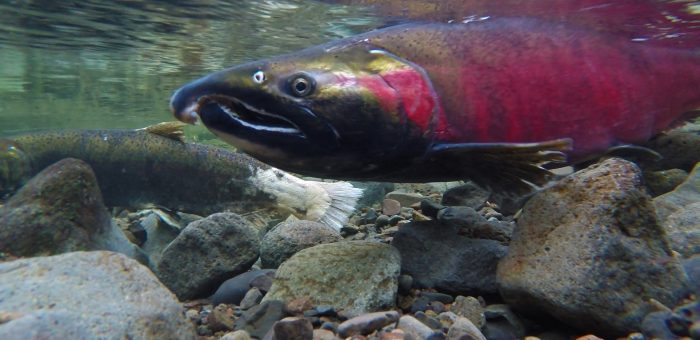Fish Farms and the Need to Protect Wild Salmon
Last week I sent a letter to B.C.’s Minister of Agriculture seeking clarity as to what the B.C. government is planning to do to promote and facilitate the transition from ocean based, open net fish farms to land based closed containment systems. Today, I followed up with her in Question Period. As you will see from the exchange reproduced below, I was very pleased with the thoughtful answers provided by Minister Popham.
 Fish farms have long been contentious on the B.C. coast due to concerns about sea lice, disease, escaped non-native species, and the impact these contaminants are having on wild stocks – many of which are already significantly depleted. Tensions between some First Nations and operating farms have escalated in the last few weeks following a salmon spill near the San Juan Islands. While action on this file is long overdue, a responsible and effective move to protect our wild salmon stocks now seems especially urgent.
Fish farms have long been contentious on the B.C. coast due to concerns about sea lice, disease, escaped non-native species, and the impact these contaminants are having on wild stocks – many of which are already significantly depleted. Tensions between some First Nations and operating farms have escalated in the last few weeks following a salmon spill near the San Juan Islands. While action on this file is long overdue, a responsible and effective move to protect our wild salmon stocks now seems especially urgent.
The B.C. Green caucus position on fish farms has always been very clear. We need to get fish farms out of the migratory paths of wild salmon. And, at the same time, the provincial government needs to promote the establishment of closed-containment systems on land.
Prior to the last election, the B.C. NDP were also very clear about their commitment to shut down open-net farms and move to closed containment, land-based fish farms. They promised to implement the recommendations of the Cohen Commission as well. This past April, NDP North Island MLA Claire Trevena – now the Minister of Transportation and Infrastructure – told a gathering of indigenous leaders in Alert Bay that if elected, her party would remove fish farms from coastal waters. “We will remove fish farms, we are committed to that and we can actually form government to make this happen and make sure that these territories and the North island are clear of fish farms”
“It can happen here,” she said of a shift to land-based fish farming. “We will make sure it does.”
These are strong words. Unfortunately, jurisdictional divisions threaten to make this far easier said than done. The federal Fisheries and Oceans Canada (DFO) department is responsible for the regulation of most aspects of the aquaculture industry in B.C. The government of Canada issues licences for marine finfish, shellfish and freshwater (or land-based) operations. Licences stipulate the volume and species that may be produced at a site and outline requirements for fish health, sea lice levels, fish containment and waste control.
To complete that structure, the province of B.C. issues tenures where operations take place in either the marine or freshwater environment, licenses marine plant cultivation, and manages business aspects of aquaculture such as work place health and safety.
So, the province only has jurisdiction over one piece of the fish farm regulatory puzzle, but it is still an important one and there is still a lot of room for progress to be made. In collaboration with First Nations and the federal government the province can take it even further. The B.C. Green caucus remains committed to advancing this issue, and making sure the NDP government does the same.
The leading closed-containment Atlantic salmon company in Canada is Kuterra, based in Port McNeill and owned by the Namgis First Nation. Kuteraa received part of its funding from Tides Canada on the basis that it provide open access to its knowledge and since become an industry leader.
 To their credit, the ocean based B.C. fish farming industry has taken measures to improve security and there have been very few escapes over the past five years. The last major escape of Atlantic salmon from a B.C. operation was in 2008 and the most recent significant fish spill was in 2014 when more than 13,000 farmed rainbow trout escaped from an operation at Brettell Point, near Powell River. This summer’s incident in U.S. waters, however, highlights the continued risk of farming Atlantic salmon in open net pens. Escaped salmon increase the risk of spreading disease to wild stocks, and heighten competition with wild Pacific salmon, which are endangered in many B.C. watersheds. It is time for governments to help the fish farming industry transition from open-net farms to closed containment land based facilities. It is time to prioritize the protection of wild salmon.
To their credit, the ocean based B.C. fish farming industry has taken measures to improve security and there have been very few escapes over the past five years. The last major escape of Atlantic salmon from a B.C. operation was in 2008 and the most recent significant fish spill was in 2014 when more than 13,000 farmed rainbow trout escaped from an operation at Brettell Point, near Powell River. This summer’s incident in U.S. waters, however, highlights the continued risk of farming Atlantic salmon in open net pens. Escaped salmon increase the risk of spreading disease to wild stocks, and heighten competition with wild Pacific salmon, which are endangered in many B.C. watersheds. It is time for governments to help the fish farming industry transition from open-net farms to closed containment land based facilities. It is time to prioritize the protection of wild salmon.
 In May, 2015, I was afforded the honour of introducing a petition by 108,848 people who are asking the government to please not issue licences of occupation to salmon farms trying to expand in British Columbia. I also introduced a second petition signed by more than 100 business organizations across the province who supported the individuals who signed the larger petition. The business organizations argued that they are convinced by the published scientific evidence that open net salmon farms are a threat to B.C. wild pacific salmon.
In May, 2015, I was afforded the honour of introducing a petition by 108,848 people who are asking the government to please not issue licences of occupation to salmon farms trying to expand in British Columbia. I also introduced a second petition signed by more than 100 business organizations across the province who supported the individuals who signed the larger petition. The business organizations argued that they are convinced by the published scientific evidence that open net salmon farms are a threat to B.C. wild pacific salmon.
Below I reproduce the exchange I had with Minister Popham as well as the accompanying media release
Video of Question Period Exchange
Question
A. Weaver: The 2017 B.C. election platform states this.
“We will ensure that the salmon farming industry does not endanger wild salmon by implementing the recommendations of the Cohen Commission, keeping farmed sites out of the important salmon migration routes and supporting research and transparent monitoring to minimize the risk of disease transfer from captive to wild fish.“
In addition, the Minister of Transportation and Infrastructure promised First Nation leaders, in Alert Bay on April 23 of 2017:
“We will remove fish farms, we are committed to that, and we can actually form government to make this happen and make sure that these territories and the north Island are clear of fish farms.“
She did so, with respect, as a means or way of convincing First Nation leaders not to vote for the B.C. Green Party.
My question to the Minister of Agriculture is this: what is the government’s plan now to implement the recommendations of the Cohen commission and assist in the transition from ocean-based fish farms to land-based closed-containment systems?
Mr. Speaker: If it was always that friendly.
Answer
Hon. L. Popham: Thank you to the member for Oak Bay–Gordon Head for the question. I appreciate it, and I want to assure the member and the people of British Columbia that our government is deeply committed to protecting B.C.’s wild salmon. It’s essential to our economy, it’s essential to our province, and it’s essential to our B.C. First Nations.
The Cohen commission recommendations are something that we did commit to in our platform, and we are absolutely committed to fulfilling those recommendations. There are federal recommendations and there is B.C.’s portion of those recommendations, and we are committing to do that.
Also, I’m sure the member probably knows that, but I did want to point out that in 2010 there was a Hinkson decision which moved the responsibility for fish health and licensing of fish farms to the federal government. The provincial government has the responsibility for tenures. It’s important to know that at this time, as we’re figuring out where we go next, there are no tenures being approved and no renewal of tenures being approved.
Supplementary Question
A. Weaver: First off, I do wish to thank the official opposition for their support in the question. I’m sure they thought I was going to offer a softball, but this is a very serious question that we would like to actually get details on.
I’d like to acknowledge that this is a very complex multi-jurisdictional issue, but let me be very clear. The Minister of Transportation and Infrastructure was forthright and clear that her government was going to remove fish farms from the migratory tracks of sockeye salmon — period. She said that to First Nation leaders in the north Island and convinced them not to vote for the B.C. Green Party because of that.
Now, my question, again to the Minister of Agriculture, is this. Does she intend, in her mandate, to end the use of open-net fish farms along the migratory passage of sockeye system, as promised to British Columbians by the now Minister of Transportation and Infrastructure?
Answer
Hon. L. Popham: Thank you, Mr. Speaker.
Interjections.
Mr. Speaker: Members, we shall…. The friendliness is wonderful, but we shall hear the minister’s response.
Hon. L. Popham: Thank you, Mr. Speaker, and thank you again for your question. I’m not sure if the member knows, but I am waiting for the recommendations coming from a report from the Minister of Agriculture’s advisory council on finfish aquaculture, which has been looking at the issue. I expect that report to be coming forward with recommendations at the end of this year. While I wait for those recommendations, I have already been on the ground, meeting with stakeholders. I’ve met with First Nations, the industry.
I’ve also sat down with the Minister of Fisheries, Minister LeBlanc from the federal government, and invited him to come sit at the table with us, because I think it’s going to take the provincial government, the federal government, First Nations and industry to sit together as we move forward and figure out the recommendations and how to implement them.
Media Release
Weaver seeks action from government to end ocean based fish farming
For immediate release
September 13, 2017
VICTORIA, B.C. – Andrew Weaver, leader of the B.C. Green caucus, is seeking leadership from the government to protect B.C.’s wild salmon stocks. Weaver questioned Minister of Agriculture during question period, after having sent a letter to the Minister last week.
“Fish farms have long been contentious on the B.C. coast due to concerns about sea lice, disease, escaped non-native species, and the impact these contaminants are having on wild stocks – many of which are already significantly depleted,” Weaver said.
“In April, NDP North Island MLA Claire Travena, now Minister of Transportation, promised that her party would remove fish farms from coastal waters.
“Last week I sent a letter to Minister of Agriculture Lana Popham seeking clarity on when and how the government intends to keep its commitment on this promise. Today in question period, I asked Minister Popham whether her government still intends to end the use of open net fish farms along the migratory paths of wild salmon during this government’s mandate.”
In her response, Minister Popham referenced plans to work with federal and First Nations governments and an upcoming report.
“While this is no doubt a complex multi-jurisdictional issue, the provincial government must play a leading role. The province needs to actively advocate for British Columbian values. They must push the federal government to adopt policies that will protect the wild salmon that are foundational to our coastal communities and ecosystems. I will continue to work with governments and stakeholders to keep this issue a priority.”
-30-
Media contact
Jillian Oliver, Press Secretary
+1 778-650-0597 | jillian.oliver@leg.bc.ca





3 Comments
I don’t understand. You speak of Atlantic salmon in closed containment. Do you support raising Atlantic Salmon in on the Pacific Coast, Mr. Weaver? What makes you confident that this is a good idea and worth the risk? Promoting industrial salmon farming of an invasive species when we have ecosystems full of native species seems irresponsible.
2015 Canadian Fisheries stats indicate that all aquaculture, all of Canada, yielded about $1 billion in production gross value. Yet employed only 3,316 – this while BC aquaculture claims 5,000+ jobs. Either way, it is an abysmal job creation ratio. And that’s not yet factoring the level of foreign ownership (almost 100%) – nearly all the profits leave BC.
This not the strong economic driver that stakeholders portray to the BC public. Long overdue that our government put it in its proper place.
http://www.dfo-mpo.gc.ca/stats/facts-Info-16-eng.htm
Deepest gratitude for keeping this issue on the front burner. Turn the heat up to highest. While I am pleased that Popham seems on side I am becoming less and less impressed with words like “commitment”, “work with”, and “sit down” with various stakeholders. Governments are expert at “sitting”. What I’d like to see from BC gov’t is an unilateral now-and-forever ban on those tenures. Let the feds issue all the licences they want but if the net farms cannot get permits then the licences are worth about as much as any of Trudeau’s other promises. It boggles my mind that First Nations have been as restrained as they have been to date and I can’t believe that will last. I’ll forward you a longer letter.